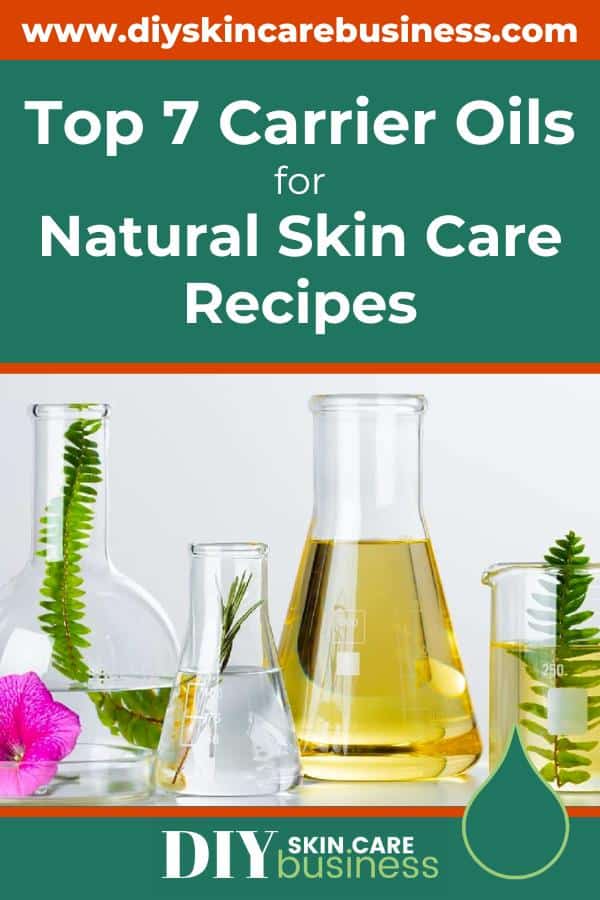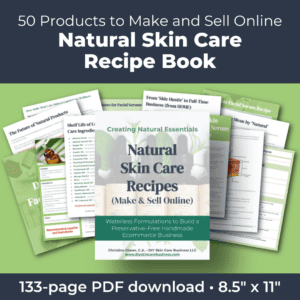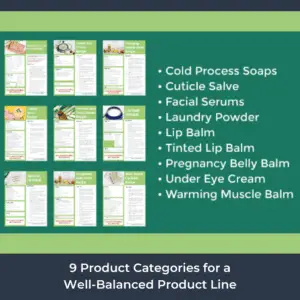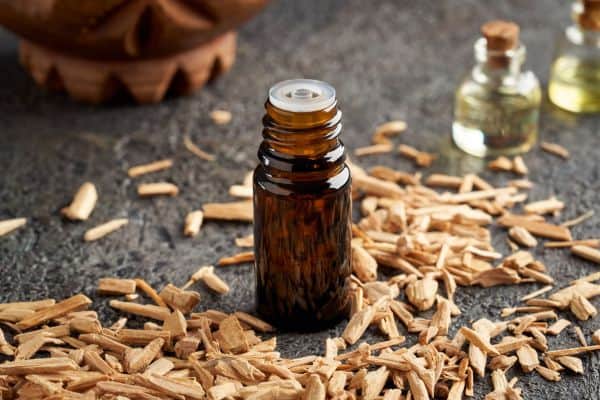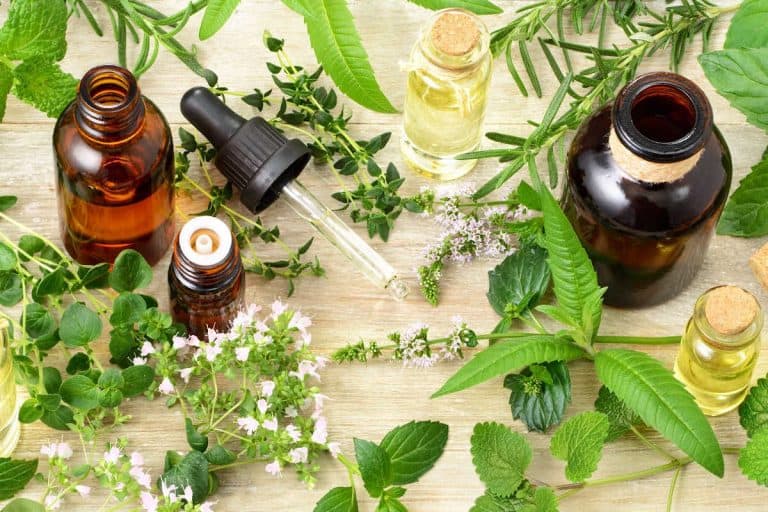It can be tricky, at best, to decide which carrier oils to purchase for natural skin care recipes as a handmade business owner (especially at the beginning).
With dozens to choose from (all with different shelf lives and price points), it’s incredibly helpful to have a small list of ‘go-to’ carriers.
When you are first starting your skin care business and sales aren’t consistent, keeping your ingredient inventory light and very intentional is key.
This is a very quick overview post that gives an aerial view of carrier oils, how to choose and use your oils, as well as seven recommended types to have on hand as you start to grow your natural product line.
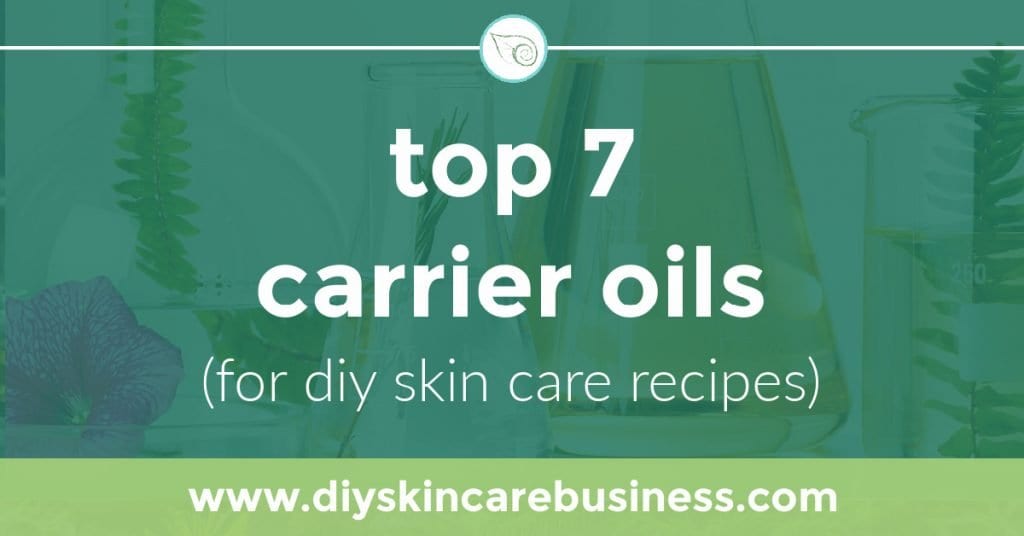
This post may contain affiliate links, meaning I get a commission if you decide to make a purchase through my links (at no cost to you). Please read the disclosure for more information.
What is a Carrier Oil?
Carrier oils are liquid vegetable oils with high viscosity that come from the seeds and nuts of a plant through a cold-processing (crushing) method. They provide vitamins, moisture, and protection for long-term skin health.
There are dozens of vitamin-rich carriers available for use in handmade skin care recipes, and they are by no means created equal.
Some carriers have shelf lives as short as six months, some two to four years, and some have an indefinite life.
Read more about the shelf lives of natural skincare ingredients here.
Additionally, some carrier oils do best if they are refrigerated whereas with others it doesn’t matter as much (as long as they’re kept at room temperature).
With all of these different variables, it’s important to know the benefits of the carrier you’re buying, what you will use it for, how quickly you’ll be using it (which will determine the amount you purchase), and how to store it between uses to maintain quality.
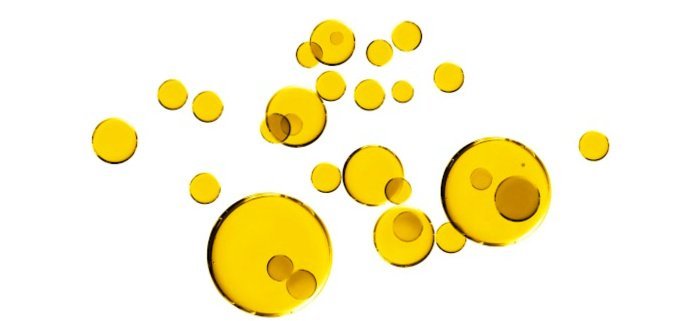
What are the Best Carrier Oils for Skin?
Trick question.
No single carrier oil is going to be the best for every person or situation.
Carriers should be intentionally chosen for recipes based on the type of skin it will be used on (normal, dry, oily, acne-prone, sensitive, etc).
The actual condition of the skin, if the user has any allergies, and where it will be applied are also huge factors to consider when choosing a natural carrier oil.
Generally speaking, thinner, lighter oils that quickly absorb will be better for facial products; other parts of the body can handle and benefit from thicker oils that are slower to absorb.
No matter the type of skin and intent of the blend, choose pure carrier oils that are organic and unrefined when you can for the best quality possible.
How to Choose a Carrier Oil for Natural Skincare Recipes
When deciding which carriers to use for a given product, the first thing that needs to be considered is the result.
- Are you wanting to soften dry skin?
- Increase hydration?
- Promote cell regeneration?
- Address skin inflammation?
- Soothe itchy skin?
Look for carrier oils that address this main goal first (keep reading for the benefits of the top seven oils on my list).
Next, consider the type of skin it will be used on to narrow down your list of choices.
- Mature skin?
- Sun-damaged skin?
- Sensitive skin?
- Acne-prone skin?
- Oily or dry skin?
After addressing these main questions and narrowing your list of carriers down, you can have fun with the artistic process of formulating by playing around with different percentages of those carrier oils to get your preferred outcome.
You can absolutely use more than one (or two) carrier oils in a recipe. In fact, I’d recommend it! You can effectively address skin issues by combining the benefits of various oils together.
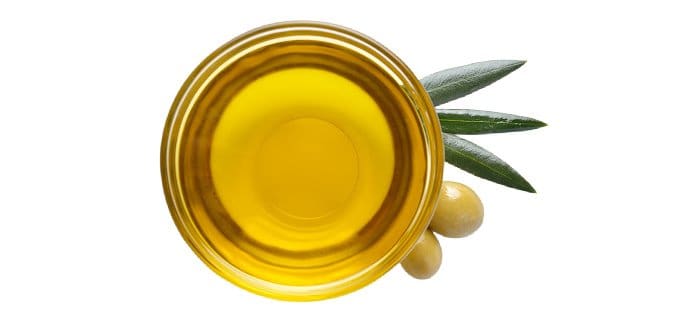
How to Use Carrier Oils for Skin Care
Carrier oils can be used on their own (or combined with other carriers) for very effective moisturizing skin care products.
They also pair perfectly with essential oils, since they are both fat-soluble and safely blend together.
Essential oils can be added at an average of a 2% dilution rate (10-12 drops of essential oil per 1 oz/30 ml of carrier oil) for most healthy adults (or a 1% dilution rate if intended for use on the face), as demonstrated in the chart below:
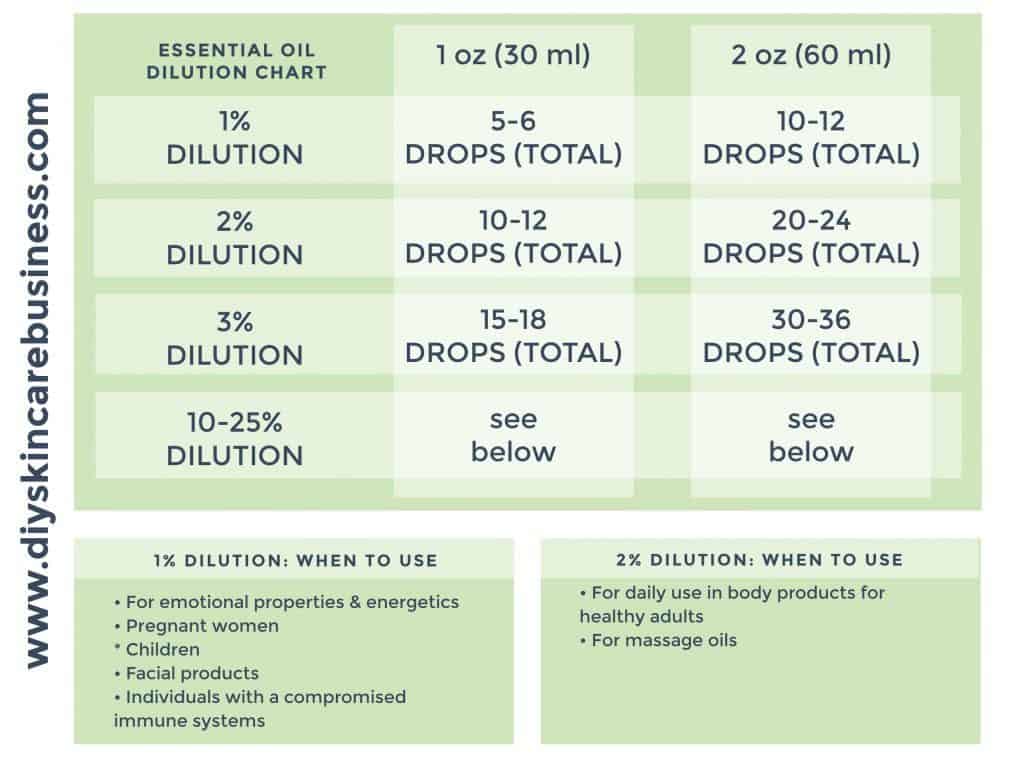
If you are interested in using essential oils in your skin care products, be absolutely sure you’ve done your research, as not all oils are safe for use on the skin or on certain individuals.
Carrier oils can also be added to harder ingredients (such as beeswax and cocoa butter) to create balms, salves, and creams.
The more liquid carriers that are added to these harder ingredients, the softer a product becomes; the less carrier added, the harder a product remains.
When creating thicker products like this that start by melting the harder ingredients on the stove, always add the carrier oils as the last step so they retain the properties that make them so beneficial (heat can break them down).
Top 7 Carrier Oils for Skin Care Makers
The seven carrier oils below are a fantastic ‘go-to’ list for handmade skin care businesses because they have a range of benefits and can be used to make hundreds of products.
I used only the top six carriers for YEARS in my own skin care shop (I hadn’t discovered the last one yet!) – they all have a fantastic price point, allowed me to grow into my business without worry as I waited for my sales to become consistent, and can easily be found through a number of vendors.
This list includes oils that are great for dry skin, sensitive skin, mature skin, cell regeneration, and may even help with scarring.
Keep these on hand – take the time to get to know each oil as you blend – their individual viscosities, aromas, colors, and results.
These are the basics that you’ll be working with closely for your entire skin care making career:
Apricot Oil for Skin Care:
(Prunus armeniaca)
Source: Apricot kernels
Shelf Life: 1 year
Benefits: Apricot oil is a light carrier oil that provides moisture to sensitive skin. It spreads easily and is quickly absorbed, making it great for babies and mature skin.
Though apricot oil benefits skin on its own, it can also be blended with other carrier oils (such as almond oil) to improve skin tone and diminish the appearance of dark circles.
DIY Skin Care Recipes that Use Apricot Oil:
- Face serum recipes (in this serum recipe bundle)
Organic Argan Oil for Skin Care:
(Argania spinosa)
Source: Nuts of the argan tree.
Shelf Life: 2 years
Benefits: Argan oil is light and easily absorbed into the skin, making it a crucial ingredient in moisturizing skin and hair care products.
This deeply penetrating oil softens dry patches and can protect from sun damage. It is considered one of the best anti-aging oils due to its properties that help tighten pores and increase skin elasticity.
DIY Skin Care Recipes that Use Argan Oil:
- Face serum recipes (in this serum recipe bundle)
Fractionated Coconut Oil for Skin Care:
(Cocos nucifera)
Source: Flesh from inside a coconut shell
Shelf Life: 2-3 years
Benefits: Coconut Oil comes in two forms: fractionated (liquid carrier oil) and 76° (solid). The infinite coconut oil uses make it the most popular oil in both forms due to its quick absorption, slight SPF, antibacterial and antimicrobial properties.
Fractionated coconut oil will never become a solid form and is a very popular carrier oil that is quickly absorbed. It is thinner than most carrier oils and doesn’t leave any residue on the skin.
Organic Jojoba Oil for Skin Care:
(Simmondsia chinensis)
Source: Beans from the jojoba bush
Shelf Life: indefinite
Benefits: Organic Jojoba Oil is incredibly similar to the oil our skin naturally produces so it is quickly and easily absorbed, making it a wonderful carrier for essential oils.
Jojoba oil is actually a liquid wax rather than an oil. This carrier is not greasy and non-allergenic, safely used around the eyes and on the skin.
One of the best benefits of jojoba oil for makers is its indefinite shelf life, which also helps to lengthen the life of other carriers in a formula.
DIY Skin Care Recipes that Use Jojoba Oil:
Rosehip Oil (Extra Virgin) for Skin Care:
(Rosa rubiginosa)
Source: Rosehip seeds
Shelf Life: 6-9 months (refrigerate)
Benefits: Rosehip Seed Oil benefits mature and dry skin due to its properties that aid in cell regeneration. Rosehip seed is a delicate oil that is easily soaked into the skin and does not leave a greasy residue.
This is also a popular oil for skin discoloration, such as age spots and acne scarring; adding essential oils and vitamin E to your rosehip can provide even greater benefits.
Note the short shelf life of this oil – be sure to purchase this in small quantities until you have a predictable sales schedule.
DIY Skin Care Recipes that Use Rosehip Seed Oil:
- Organic under-eye salve recipe
- Facial serum recipes (in this serum recipe bundle)
Sweet Almond Oil for Skin Care
(Prunus dulcis)
Source: Kernels of sweet almonds
Shelf Life: 1 year
Benefits: Sweet Almond Carrier Oil is extracted from the dry kernels of sweet (edible) almonds. Rich in Vitamin E, proteins, and numerous minerals and vitamins.
Sweet almond is easily absorbed and can be used on all skin types for deep moisture.
DIY Skin Care Recipes that Use Sweet Almond Oil:
- Herbal infusions
- Alkanet lip tint recipe
- Mica tinted lip balm recipe
- Organic belly balm recipe
- Cold process shaving soap bar recipe (in this cp soap recipe bundle)
- Facial serum recipes (in this serum recipe bundle)
Tamanu Oil for Skin Care
(Calopphyllum inophyllum)
Source: Nuts extracted from the fruit of tamanu trees
Shelf Life: ~4 years
Benefits: Tamanu oil has incredible healing properties and is very effective for use in blends formulated for wounds, scars, and healthy skin growth.
The aroma of tamanu oil is very strong, which some people like and some people don’t. Mixing it with other carriers and essential oils can tone it down as needed.
DIY Skin Care Recipes that Use Tamanu Oil:
- Herbal infusions (in very small percentages)
- Organic cuticle salve recipe
- Organic acne scar salve recipe
Looking for more Natural Skin Care Recipes to Sell Online?
Check out this PDF download of 50 recipes that are RETAIL-ready for the handmade skin care business owner, all wonderfully natural (and with great profit margins to boot)!
Grow Your Skin Care Business!
Browse through the resources below to boost your handmade business visibility and profitability!
